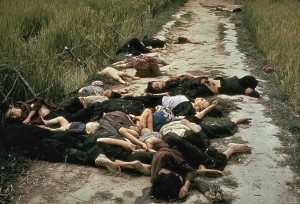
The bodies of Vietnamese men, women and children piled along a road in My Lai after a U.S. Army massacre on March 16, 1968. (Photo taken by U. S. Army photographer Ronald L. Haeberle)
In late 2002, just prior to the launch of the U.S. "shock and awe" campaign against Iraq, I was invited to join a gathering of intelligence analysts at the U.S. Army War College in Carlisle, Pennsylvania, to participate in an Iraq "war games" exercise. We were assigned specific roles and asked to "play out" various political and diplomatic scenarios that might unfold in the wake of a U.S. attack on Iraq.
A tall, heavy-set Iraqi-American, who was present as an observer and seated beside me on the final day, remarked quietly: "All these people are talking about strategic, political and military issues; no one here is talking about the hundreds of thousands of people -- my people -- that are going to die."
His words struck me as profoundly tragic, and the tears welling up behind his dark glasses made me feel suddenly ashamed to be there, aware of the complete absence of consideration for Iraqis. I struggled to find something to say that would console the man, but found myself at a loss.
All these years later, that incident has come back to haunt me as we approach the precipice of yet another deadly war. Will we allow ourselves to be blinded again?
As Israeli leaders engage in frenzied posturing over a possible military strike on Iran, we again have pundits, experts and commentators speculating how an Israeli offensive would play out. They search for the meaning behind the inflammatory rhetoric of Defense Minister Ehud Barak and Prime Minister Benjamin Netanyahu, and ponder the impact of a war on Western political, strategic and economic interests.
As with the war games I attended at the War College 10 years ago, their narrow focus on strategic and tactical aspects of a potentially serious conflict conveniently avoids the fact that we are talking about the mass murder and maiming of Iranian civilians, as well as many others in the region.
Attack on Bushehr: "Death of Thousands"
In a thought-provoking piece on this subject, Professor Marsha B. Cohen, a specialist on Iranian-Israeli issues, notes that a 114-page paper commissioned in 2009 by the Center for International and Strategic Studies, "Study on a Possible Israeli Strike on Iran's Nuclear Development Facilities," devoted just two pages to the subject of anticipated human losses (pp 90-91).
The study says that "any strike on the Bushehr nuclear reactor will cause the immediate death of thousands of people living in or adjacent to the site, and thousands of subsequent cancer deaths or even up to hundreds of thousands depending on the population density along the contamination plume," adding that "Bahrain, Qatar and the United Arab Emirates will be heavily affected by the radionuclides."
In other words, the paper acknowledges that since the spread of nuclear radiation does not stop at national borders, civilian populations throughout the region, including those of U.S. allies, will be forced to suffer the horrific consequences of any Israeli military adventures in Iran.
The paper charts the range of human suffering and death from radiation according to the degree of exposure, ranging from 0-50 Roentgens -- "no obvious effect, possibly minor blood changes," all the way to 5,000 Roentgens -- "incapacitation almost immediately; all those exposed will be fatalities within one week." An accompanying map of the region displays prevailing wind patterns, indicating where the radiation is likely to drift.
Without further discussion of the humanitarian dimension, the next page goes on to talk about the varying technical attributes of the Israeli and Iranian missile systems.
Human Empathy, Casualty of a War Culture?
Why is it that U.S. policymakers and those in the intelligence agencies and think-tank communities who support them seem to have so little compassion for the victims of their political and military decisions? Have they become too far removed from suffering, as they are shuttled from meeting to meeting in their chauffeur-driven SUV's and Town Cars?
The subject of human suffering is almost taboo among these elites, and is generally raised only when negative media publicity, or the prospect thereof, forces them to take action.
(Note: You can view every article as one long page if you sign up as an Advocate Member, or higher).




